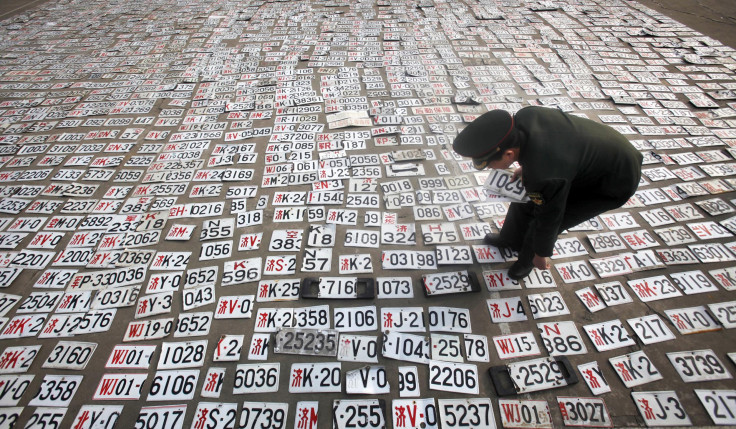Four Unconventional Ways The Chinese Make Money: From Renting License Plates To Censoring Bad Press

It’s no secret that Chinese bureaucrats and high-ranking officials, like Brother Watch and this cheating bureaucrat, have countless ways to profit from their positions, but even regular citizens in China seem to find creative ways to make money.
Here are four of the more interesting ones, perhaps not as stable as a 9-to-5 job but potentially lucrative if one is crafty. Don’t get too excited, though: Most of these "vocations" are illegal and will only work in China, where any small hole in regulations is guaranteed to inspire some people to exploit it.
• License Plate Rental
Beijing's horrific traffic is legendary. At the end of 2010, in order to alleviate congestion, the city of Beijing announced a new regulation limiting the number of new cars to 20,000 per month. License plates are distributed via a lottery on the 26th of each month. Even before the new regulation, one had to have a local-resident identity card, something like a driver’s license, to own a car in Beijing.
Wang Xiuxia, a middle-aged Beijing woman, took advantage of the excess demand. Before the new regulation, she rented identity cards to people from outside Beijing, which is illegal, according to the Caixin, a Chinese financial news site. After the limit came into effect, she began directly renting license plates she had amassed – she held nearly 1,000 plates by the time she was busted recently, or equal to 5 percent of new plate numbers issued in Beijing each month.
Wang’s business was highly profitable: Just one of her plates rented for 10,000 yuan ($1,633.85) in 2011. She also sold some, for as much as 150,000 yuan. Unfortunately for the drivers who rented from Wang, all of the plates she held are now defunct.
• Online Censorship for the Private Sector
China is famous for its censorship of the arts and the Internet, so it should come as no surprise that private companies carry out the same tactics, in the name of “online public relations.” On the website of a company based in Beijing, it is clearly stated that the company is “professional in deleting negative information,” which includes deleting negative news, negative information, posts, blogs and even snapshots of clients.
An IBTimes China reporter interviewed an employee of the company, identified only by his surname Yang, and found that prices for the service range from several hundred yuan to more than 10,000 yuan, depending on types of articles and types of websites they are posted on. Clients can get rid of unwanted coverage through “soft deletion,” which refers to deleting with the help of editors of the relevant websites, or through “hard deletion,” which is done with the help of hackers. They can also choose to bury negative press – for example, by putting out 10 positive news items in a flurry and sharing them among 40 or 50 media outlets, which can cost as much as 35,000 yuan.
• Luxury Shopping Agents from Abroad
Luxury items in China often cost much more than the same products overseas, owing to China’s high taxes and markups -- not to mention that some things are not available in China at all. Both are reasons for Chinese tourists to flock to high-end boutiques when traveling abroad.
But some clever sellers avoid travel and simply ask someone who is studying or working abroad to buy what they want to resell. The price differential is then split between the two parties, meaning the person in China gets their Prada bag for a much lower price, and the person in the U.S. gets a small commission.
Many Chinese graduate students use this model to supplement their living stipends. Shopping agents in particularly fashionable countries like France are especially in demand, and can stand to gain a huge following and loyal customers on Weibo, China’s best-known microblogging platform, or other social media outlets. Those located in tax-free states in the U.S. can often make a bit more than their counterparts in New York City, for example.
• Relocation Compensation
All developing nations face the inevitability of relocating residents to facilitate the process of modernization. In many places in China, the residents receive the short end of the stick. Often, the compensation does not match the value of the land they had to vacate. But some residents manage to find ways to enhance their compensation.
The rules for relocation are complicated and depend on the city, but in general, compensation depends on two things: the size of one’s existing land or house and the number of people living there currently. One man in Nanjing, identified by his last name of Cai, divorced his wife and married his wife’s sister in order to be compensated for 80 square meters more than he would have gotten originally, because divorced couples count as two households.
Some schemes don’t quite work out. Zuo Xiao Zu Zhou, a popular artist and musician, posted on Weibo that the government is forcefully moving his wife’s family out of their home, and he received tremendous support. But it later surfaced that while his neighbor received 1.2 million yuan ($196,062) for moving, Zuo’s family insisted on asking for 7 million yuan. In addition, the photos Zuo posted were actually of his neighbor’s house, not his own, misleading the public to believe that his house had been torn down already.
© Copyright IBTimes 2024. All rights reserved.





















